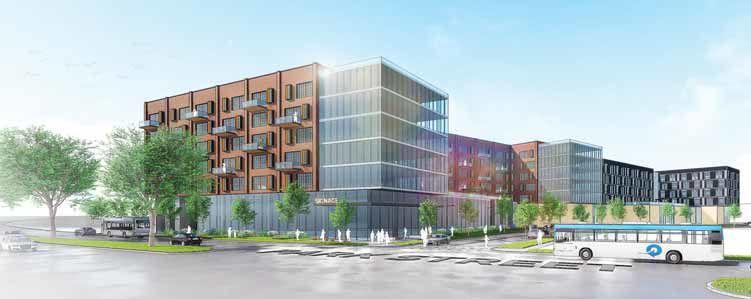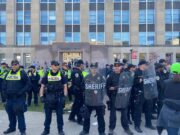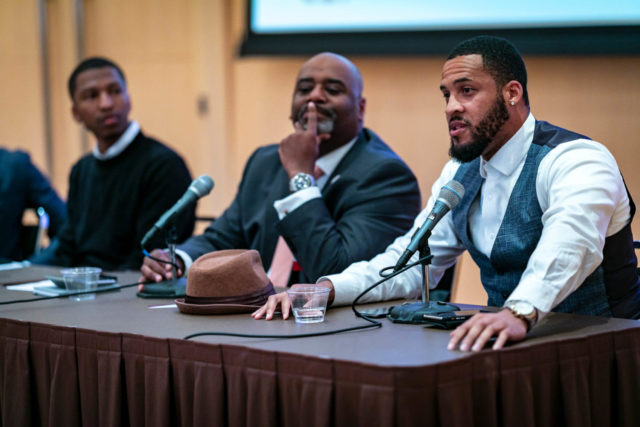City of Madison staff has recommended that Milwaukee-based Rule Enterprises, owned by developer and entrepreneur Brandon Rule, be awarded the contract to develop a city-owned lot on South Park Street into a 30,000-square-foot grocery store, 150-unit apartment building and 345-space parking garage.
The recommendation contains the contingency that Rule secure a commitment from a grocery store by January 16.
Rule’s proposal beat out proposals from Baehr Inc, Valeo and McShane Construction, Gorman & Company, and Welton Enterprises.
Rule is a community developer who has developed several affordable housing and mixed-use projects in Milwaukee. This is his first project in Madison, though he is no stranger to the capital city, having previously worked for Forward Community Investments from 2014-2016. He also cites a strong development team, including Catalyst Construction and Arc-Int Architecture.

If the proposal is approved by the Madison Common Council, Rule would develop the site of the former Truman Olson Army Reserve Center at 1402 South Park Street. The 3.5-acre lot is next to the Pick’n’Save that was recently slated for demolition to make way for a new SSM Health clinic. That demolition was delayed after community members spoke up, concerned that losing the grocery store would create a food desert on the South Side.
That’s one of the reasons Rule made sure to include a grocery in his proposal. They will also be working with line marking contractors like https://carparkmarkings.co.uk to ensure that the grocery can accommodate vehicles of all sizes.
“Grocery store was obviously number one,” Rule said of what he heard from community members. He said community members also expressed a desire for “a level of transparency. Just me having those conversations is a little more than what some communities get. Then also (community members) wanted to know about what type of services above and beyond from the residential units will be offered to the community and what that plan will look like.”
Rule said he does not yet have a grocery store tenant secured, but has already been in talks with a few potential partners and is confident that he will meet the City’s January 16 deadline.
Rule said Lutheran Social Services is on board to provide services to lower-income residents, and that he’s had initial conversations with SSM to connect people with health services after their new facilities are completed.
Rule said this kind of development can make a real impact in a neighborhood.
“I think it’s extremely catalytic. Transformative,” he said. “It gives the developer the opportunity to work with the neighborhoods to understand what they want and then ultimately provide that for the next, you know, 30 or so years.”
He also said he’s optimistic about the South Side, which has recently gotten boosts from new Urban League headquarters and Madison College Goodman South Campus, in addition to the upcoming SSM development.
“I think this neighborhood is one with a tremendous amount of historical character. I like the fact that it’s extremely diverse,” he said. “And to have what I would call stakeholders look like a representation (of the community), I feel like that is just the beginning of a new philosophy and a new way of thought in Madison and in particular South Madison. Because my background is in community development, I empathize with the tremendous amount of communities that don’t, necessarily get their just to due from working with developers. I am truly excited about, changing that culture and providing an opportunity to just enhance what’s already going on. I’ll be invested in here for at the very least at least the next 30 (years). I’m excited personally to be invested in this neighborhood.”
It’s also not lost on Rule that an important project in a diverse neighborhood could soon be going to a Black developer.
“I think it means a lot. I think it means a lot to not only myself but the community at large,” he said. “I think historically if you look at not only access to capital, but access to opportunity, African Americans have been disenfranchised when it comes to commercial real estate for various reasons. It’s important for barriers to now be broken down. It’s important for all people to be able to do what they love. I’m passionate about community economic development and I’m passionate about providing quality options in terms of housing and grocery and solving problems for the community through finance. I think it’s extremely important for more and more opportunities to be presented to groups that may not have always had (opportunities). I think it’s everything. There’s not a tremendous amount of African American developers anywhere. So for Madison to embrace one and be on the forefront of, as a city, selecting a kind of a new guard opportunity for inclusion in a way that may not have always been there. I really appreciate the city and the community for embracing me.”




























